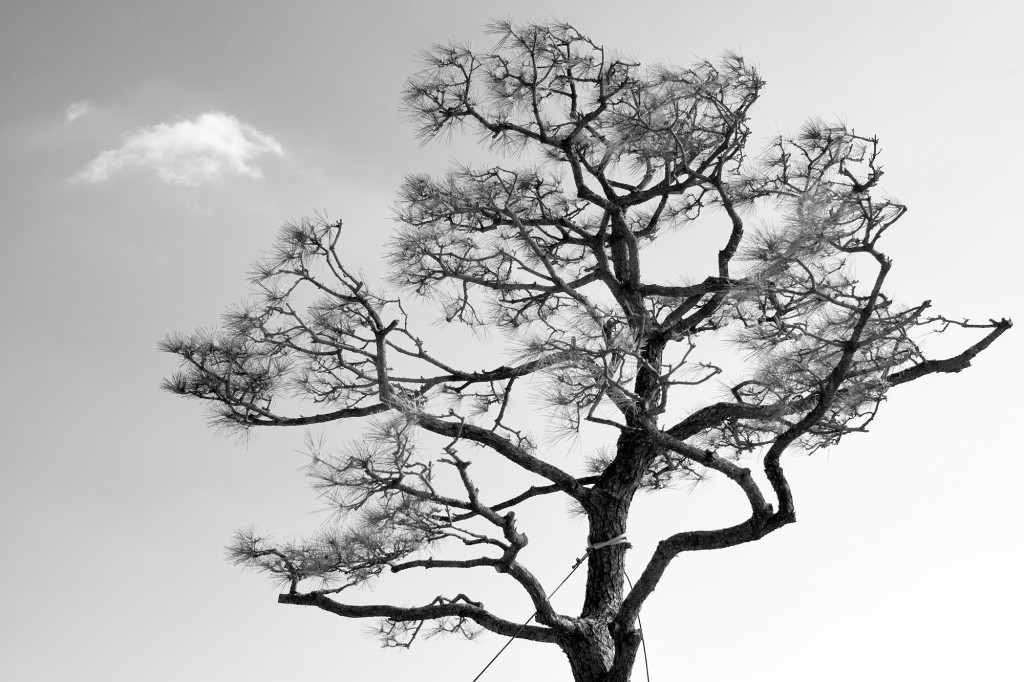Written by Josephine Reece
Before we loved each other we loved the mountain. (When traveling to a new place how can you guess what will grip your heart?) Our mountain rests on the skirts of downtown, hemmed by a lake and a river of cherry trees. My host mother and I walk here once, maybe twice a week. There is not much to say on the mountain, but words carry more gravity. They drop and settle like stones kicked into the water — invisible later, even to ourselves. The mountain in turn has settled into the city. It is there behind each street, each building, each man, each woman, each child and even behind my mother and me.
My host mother has lived in Gumi her entire life. She told me once that during college she moved to the nearest big city, but “I missed my town.” She was homesick by a 40-minute train ride, homesick for a town where, my students tell me, “Nothing is special.” For their speaking test in the fall, I asked my students, “What is special about Gumi?” Nothing, most replied. In suburban Korea, status is measured by the number of Caffé Benes your town holds. If you know the answer by heart then your town is “nothing special.”
Sometimes I agree with them. Who, for instance, would choose to love this city fueled on the ghost of over-eager expansion? Here the gaping eyes of unfinished apartments stare out across the pepper fields and trash-compacting facilities. Here the ancient Nakdong River weaves itself through a labyrinth of factories. Damp air carries chemical scents past our school all day. Yet who can help but love waking up on a sun-sick morning to find that the pumpkin vine on your neighbor’s roof has borne fruit?
“What is special about Gumi?” I ask my students. “Gumi has Geumosan[1. Geumo Mountain],” one replies.
In the early spring I walk with my host mother down the lane of cherry blossoms leading to Geumosan’s base. It rained last night and will rain again soon. We can feel it in the damp air and the soft chemical scent it carries from the industrial sector to the south. Still, the park is full of people. This time of year work ends early, or, work does not end early but everyone is on holiday. I wonder how it feels to see the cherry blossoms year after year; even my host mother is suddenly young among the flowers. Couples with tripods pose beneath the cloudy blossoms. A troupe of children is singing in a makeshift amphitheater. My host mother and I swing our arms; we march our feet. We take candy from the woman advertising a new restaurant and leave her flyers in a bush. We buy ppeong-twigi[2. A puffed rice crisp, it gets its name from the sound it makes (ppeong!) as it pops out of the machine.] and wait impatiently for our bag to fill. Ppeong, ppeong, ppeong. Next to the ppeong-twigi cart is a man dressed as a belly dancer singing trot[3. Named after the two-beat “fox-trot,” trot is the earliest form of Korean pop music.] and selling dry rice-cakes. “야 야 야 내나이가 어때서 / 사랑에 나이가 있나요[4. “Hey, hey, hey, what’s wrong with my age / Is there an age for love?” from singer Oh Seung Geun’s “내나이가 어때서.”],” he sings. The rain is starting — a drop hits my nose, hits the children who have stopped singing, hits the couples trying to shelter their tripods — but the man doesn’t care. He looks as if he could sing forever, slowly swaying his shoulders from side to side.

As we grow older we talk about “putting down roots.” Roots tie you down. Yet roots have a purpose; they are always searching, always thirsty. To live in a place is to become tangled, is to grow. Without even realizing it, I was putting down roots in Gumi. Little tendrils tying me to a place and people of whom I knew nothing except that we were together.
Before we leave the park my host mother and I tie our wishes to a tree. The flimsy colored papers flutter brightly against the gray sky. The men with their food carts struggle to set up umbrellas in the rising wind. My host mother and I don’t share what we wrote. As we turn to go I have already forgotten which paper was mine. Together they cling to the branch, indistinguishable now from one another. Two papers on a branch; two people on the path. The rain is coming down harder now. Throwing our jackets over our heads, my host mother and I run to the car. With the rain outside, the car’s shivering darkness feels like a pocket of air in the deep sea. Cherry trees slide by, ghostly in the stark illumination of the headlights. Stopped at an intersection I become aware of Geumosan. It is on our left, haltingly illuminated by the passing cars. I watch for a moment as sections of rock face are revealed and disappear. Then the light changes and together my host mother and I turn, keeping Geumosan behind us through the night.
Josephine Reece is a 2013-2014 ETA at Gumi Shinpyeong Middle School in Gumi, Gyeongsangbuk-do.
Footnotes:
